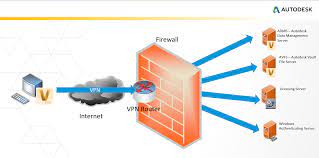The Importance of VPN Firewalls in Ensuring Online Security
In today’s digital age, where cyber threats are rampant and online privacy is increasingly at risk, the use of VPN firewalls has become crucial in safeguarding sensitive data and ensuring secure internet connections.
A VPN (Virtual Private Network) firewall combines the benefits of both a VPN and a firewall to create a robust defence mechanism against malicious actors seeking to compromise your online security. A VPN encrypts your internet traffic, making it unreadable to anyone trying to intercept it, while a firewall acts as a barrier that filters out potentially harmful incoming and outgoing data.
By using a VPN firewall, you can browse the internet anonymously, protect your personal information from prying eyes, and access geo-restricted content without compromising your security. Whether you are using public Wi-Fi networks or conducting sensitive transactions online, a VPN firewall provides an extra layer of protection that is essential in today’s interconnected world.
Businesses can also benefit greatly from implementing VPN firewalls to secure their internal networks and communications. By establishing secure connections between remote offices or enabling employees to work remotely without sacrificing security, organisations can mitigate the risks associated with cyber threats and data breaches.
It is important to choose a reputable VPN provider that offers robust encryption protocols and reliable firewall protection. By investing in a quality VPN firewall solution, you can enjoy peace of mind knowing that your online activities are shielded from potential threats and vulnerabilities.
In conclusion, the use of VPN firewalls plays a critical role in enhancing online security and privacy for individuals and businesses alike. By adopting this advanced technology, you can fortify your defences against cyber threats and enjoy a safer browsing experience in an increasingly digital world.
Understanding VPNs and Firewalls: Key Questions Answered
- Do I need firewall with VPN?
- What is the difference between a VPN server and a VPN firewall?
- What are the 3 types of firewalls?
- How to setup firewall for VPN?
Do I need firewall with VPN?
When considering whether you need a firewall with a VPN, it’s important to understand the distinct roles that each plays in ensuring online security. While a VPN encrypts your internet traffic and protects your data during transmission, a firewall acts as a barrier to filter out potentially harmful incoming and outgoing traffic. Combining the two technologies provides a comprehensive approach to safeguarding your online activities. A firewall with a VPN offers an added layer of protection against cyber threats, helping to secure your connections and data from malicious actors. Therefore, investing in a firewall alongside your VPN can enhance your overall cybersecurity posture and provide you with peace of mind while browsing the internet.
What is the difference between a VPN server and a VPN firewall?
A common query often arises regarding the disparity between a VPN server and a VPN firewall. While a VPN server primarily functions as a gateway for users to establish secure connections and access remote networks, a VPN firewall serves as a comprehensive security tool that combines the functionalities of a VPN and a firewall. The key distinction lies in their roles: the VPN server facilitates encrypted communication between devices, whereas the VPN firewall adds an extra layer of protection by filtering incoming and outgoing data to prevent unauthorised access and potential cyber threats. In essence, while both are integral components of secure networking, the VPN server focuses on connectivity, while the VPN firewall prioritises security measures to safeguard sensitive information and ensure safe online interactions.
What are the 3 types of firewalls?
When considering the question “What are the 3 types of firewalls?”, it is important to note that there are three primary categories of firewalls commonly used in network security: packet filtering firewalls, stateful inspection firewalls, and proxy firewalls. Packet filtering firewalls examine incoming and outgoing data packets based on predetermined criteria such as IP addresses and port numbers. Stateful inspection firewalls monitor the state of active connections to determine whether incoming data packets are legitimate. Proxy firewalls act as intermediaries between internal and external networks, inspecting and filtering traffic at the application layer. Each type of firewall offers unique features and capabilities to enhance network security and protect against cyber threats.
How to setup firewall for VPN?
Setting up a firewall for a VPN involves configuring your firewall settings to allow traffic specifically for the VPN connection. To do this, you need to create rules that permit the necessary VPN protocols and ports to pass through the firewall while blocking all other traffic. Typically, you would need to open ports such as UDP 500 (for IKEv1), UDP 4500 (for NAT-T), and protocols like IPsec or OpenVPN, depending on the VPN service you are using. It is important to follow the specific instructions provided by your VPN provider for setting up the firewall correctly to ensure a secure and stable VPN connection.

